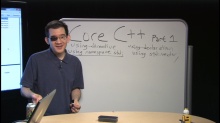C++ Primer 5th Edition, Part 1: How To Revise a Textbook
The C++11 update to the classic C++ Primer is almost here! Andy Koenig reports:
Barbara Moo shipped the completed text of the C++ Primer, Fifth Edition to the publisher on July 13. As far as I know, copies are already being printed; they should be on bookstore shelves by mid-August.
This book has been a major project for her for the past two years or so, and an all-consuming one since about the beginning of this year. I've spent a fair amount of time on it as well: reading drafts, making comments and suggestions, running test programs, and so on. As a result, I've had a pretty good idea of what she's been thinking about as she wrote the book, and I'm in a position not only to tell you what I've learned about her strategy, but also why I think her strategy is a sensible one


 Core C++, 2 of N: Template Argument Deduction -- Stephan T. Lavavej
Core C++, 2 of N: Template Argument Deduction -- Stephan T. Lavavej